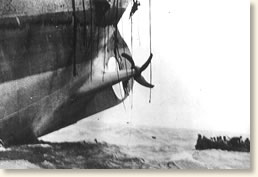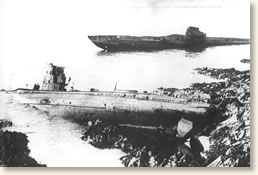|
Torpedoed! 1917
World War I witnessed the introduction of a number of technological innovations to improve the ability to deliver death and destruction to the enemy. Among these was the submarine. (see U-boat Attack, 1916). Below the water's surface the
 |
Last minute escape from a ship
torpedoed by a German submarine, 1917.
|
submarine roamed unseen and undetected. A submarine's attack was particularly horrifying because, if there was any warning, it arouse only if the bubbly wake of the submerged torpedo that was about to deliver death and destruction was detected before it struck. More horrifying was the knowledge that even if a torpedo was observed, there was little that could be done to thwart its mission of death.
For many victims of a submarine attack, however, there was no warning. Awareness occurred only after the torpedo had found its mark. A loud noise, a lurching of the ship and the excited cries of passengers and crew would mobilize the torpedo's victims into action. Rushing to a pre-assigned lifeboat, the only recourse for the torpedo's targets was to lower themselves into the sea and hope for rescue.
The following eyewitness account comes from a member of the crew aboard a British passenger ship plying the Mediterranean Sea. We join his story as a torpedo slams into his ship:
"The first torpedo struck us at a few minutes past ten o'clock in the morning. I was down below in the saloon with E. We had both kept a boat-watch during the night and were the last officers to come to breakfast.
The saloon was a fine, large place, with lots of glass and tables and white-jacketed stewards. Above, on the decks, the men and most of the officers had fallen in at dawn and were to remain alert during our passage through the danger zone. A couple of Japanese destroyers, one to port and one to starboard, formed our escort. Our course was a series of zigzags at fourteen knots per hour by day and rather more at night.
E. and I ate our bacon and eggs and drank our coffee. The steward waiting on us was a clean-shaven little fellow who looked much like a low comedian. When the torpedo struck, there was no mistaking it for anything else. E. and I laughed, as much as to say: 'Here she is!' Then I put on my cork belt, asked myself whether any part of me had suffered in the explosion, and received a confident answer, and next I leaped up the three flights of stairs that led to the liner's deck and my own boat-station.
E. raced with me. I have never seen him since. He had a lovable habit of mothering people. I dare say it cost him his life. There is something specially tragical about this officer's disappearance. He was the last of three brothers. Two had died gallantly in France, and so that one of her boys might be spared to the bereaved mother, E. had been taken out of the trenches and given a 'safe' job at the base; yet even so the Fates had followed him.
The stewards and cooks raced with us too. There was something theatrical and cinema-ish about that picture - so many white jackets and blue uniform trousers and white overalls.
All this time - it might have been a couple of minutes - the greater part of me was so active that I have no recollection of any instant devoted to fear. Crude and horrible as it may sound, there was a large portion of my consciousness which was most vividly and delightedly enjoying itself. . .
Just picture us, on a great liner, cosey as a grand hotel. Everything was remote from war and death, as I have seen them so constantly on land these last three years. No mud, no dirt, no continuity. And we were all at ease and leading civilian lives, with bathrooms, linen sheets, and even an American bar! I don't know why, but I had imagined it all quite differently.
As one rushed up-stairs one thought of things one had valued yesterday - two brand-new pairs of boots, one's field-glasses, some money - they seemed now so utterly of no account. Providence must have been with me, for, arrived on deck, I stood flush before my boat, Number 13. I stood there and took charge. To left of me the right people were busy with our sixty-six sisters. These ladies were part of the staff of a new hospital unit. Safely they were put into their boats, safely lowered, and safely rowed away from us. We cheered them as they left, and they cheered back. Then Tommy, lined on deck, struck up a song. He always does in moments of emotion.
I had filled my boat as full as it would go. All was ready. I stepped on board and gave the signal. Then slowly we descended. Above our heads one of the ship's officers was seeing to it that we went down all right. Immediately below us was another boat. It pushed off, at last, and now we were free to hit the water. Before we pushed off I took on five of the crew who had helped to lower us. They swarmed down the ropes and reached us safely. Then I refused to take anybody else and we got the oars out and rowed away. Only then did I notice that the ship had stopped dead. She looked perfectly steady, like a ship anchored. . . .
So we floated, one of many little units, on those waters; and for a long time we were kept passionately interested by what we saw. Speaking for myself, I have never lived through moments so tense, so big, so charged with all extremes and textures of emotion.
 |
Two German submarines sunk off the
English coast and washed ashore
at Falmouth after the war. 1921
|
The big ship - she was near to 15,000 tons - stood like an island, and as if she could stand forever. While one of our destroyers went away on an unknown quest, the other drew alongside. We saw the little khaki figures swarm into her, and, to be frank, we envied them. Then the destroyer maneuvered, and there was a flash and an explosion. A second torpedo had struck and the Japanese commander had just dodged it. We now saw that his mast was broken and his wireless installation was sagging. But still the great ship stood there like an island. . . .
That moment passed, as did many another. I remember especially seeing another boat with only five men on board, four rowing gaily [sic] past us, the fifth baling. It seemed to us a horrible injustice, and several of my men said so aloud. I negatived [sic] the proposition, however, that we should get alongside and in part transfer. We seemed all right, and it struck me as best to leave well enough alone.
There followed next the most dramatic period of that spectacle. So far the great ship had stood firm, as if anchored. We noticed now that she had a definite list to starboard. The angle grew steeper, and then suddenly her bow dropped, her stern lifted, and next she slid to the bottom like a diver. It was as though a living thing had disappeared beneath the waves. We watched her, open-mouthed, a tightness at our hearts. We missed the comfort of her presence, we felt the tragedy of her surrender. In her death and engulfment there was a something more than human. So might a city built by countless hands and quick with life pass suddenly away. From somewhere in the middle of her bled a great puff of smoke, and I noticed that her deck as she stood on end, one half of her submerged, was bare and naked. It might have been a ballroom floor. . . ."
References:
This eyewitness account was originally published in: Kinross Albert, How it Feels to be Torpedoed, Atlantic Monthly, December; 1917, republished in: Hart, Albert Bushnell, American History Told by Contemporaries v. 5 (1929).
How To Cite This Article:
"Torpedoed!, 1917" EyeWitness to History, www.eyewitnesstohistory.com
(2009).
|






